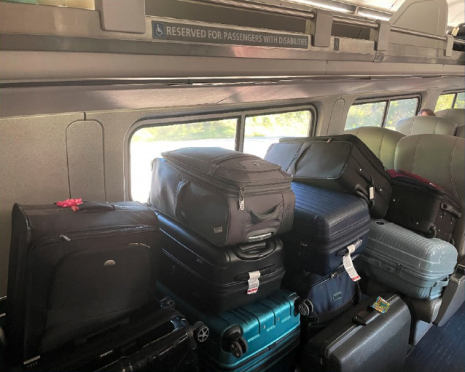Happening Now
Amtrak Agrees to Better Service for Passengers With Disabilities
July 15, 2025
By Jim Mathews / President & CEO
Amtrak’s Inspector General’s office, or OIG, concluded that the railroad needs to do a better job of taking care of its passengers with disabilities, following a nearly four-year review of data and complaints that also included eight site-visit trips on four different Amtrak routes.
Executive leadership at the railroad agreed and is taking steps to improve those services.
OIG auditors gave Amtrak credit for working to improve service for passengers with disabilities but noted that the railroad lacks a unified strategy to guide these efforts across departments. It also fails to consistently track and analyze key data, limiting its ability to assess service quality and meet Federal requirements.
To address those issues, a report released today recommends that Amtrak create a clear, company-wide strategy for serving passengers with disabilities, including defined goals, roles, and coordination across departments. It also suggests improving how accessibility complaints are tracked and resolved, using more data to monitor service quality, and making sure all frontline staff are properly trained – during the most recent training cycle, 512 of Amtrak’s 5,732 customer-facing employees had not completed required accessibility training.
Auditors also want Amtrak to better include passengers with disabilities when updating travel information and to seriously explore ways to make onboard amenities — like food service — more accessible before waiting for new fleet designs to enter service, bringing proposals to leadership based on a cost-benefit analysis.
“Our review of a sample of customer complaints highlights a particular challenge” with assistance and accommodations for accessible travel, the auditors said. “273 of 708 accessibility-related complaints (39 percent) were related to poor assistance at stations and with boarding and deboarding, and 155 of these complaints (22 percent) were related to insensitive staff interactions. Representatives from all nine of the advocacy groups we spoke with also told us that customer-facing employees could improve their service.”
OIG also pointed out something that most regular Amtrak riders already know. Onboard employees inconsistently enforce disability policies such as keeping accessible seating areas clear of luggage or stored supplies. Inspectors rode four different routes as part of their review (the Cascades service, the Carolinian/Piedmont, the Lake Shore Limited, and a Northeast Regional run), and on each train they found examples of blocked seating areas.

Online booking, too, fell short in important ways. Amtrak's online booking system doesn't allow passengers to request in-station assistance when one of the stations lacks service, and it fails to notify users that they must call to request help. Important station-specific accessibility details, like construction disruptions, are often missing or hard to find, especially during mobile booking. Most accessibility information, such as help with restrooms or food service, is buried in small or unclear links, making it difficult for passengers to locate.
“When we visited the Quantico, Virginia station, the regular pedestrian pathways were closed; instead, passengers needed to navigate through a construction area and cross live tracks to enter or exit the platform, potentially posing safety risks,” the auditors said. “The company, however, did not provide information about the closure during the booking process or at any point prior to boarding.”
Amtrak President Roger Harris agreed with all six recommendations from the Inspector General and outlined steps the company plans to take, each with a specific target completion date. For the top recommendation—creating a company-wide accessibility strategy—Amtrak says it has already begun building a strategic framework and will finalize a plan by March 2026. The company also committed to improving how it tracks and resolves accessibility complaints, implementing a new workflow and setting timelines by September 2026, though it disagreed with the IG’s finding that a large number of complaints were missed.
“While the tracking of complaints has improved over the years, Amtrak agrees there is the potential for complaints to be missed,” Harris acknowledged in a written response to the report.
“Although the report used a keyword search, we disagree that a significant number of complaints were not tracked,” the response continued. “The team queried a small test sample (May 2025) with the list of keywords provided by OIG and found that 5 out of 27 complaints were ADA related and those five were appropriately tagged and escalated to the Accessibility Office. The remaining 22 ranged from praise to service complaints and were not ADA related. Notwithstanding our queries, Amtrak is committed to ensuring coding of ADA complaints is accurately captured in the tracking and reporting systems.”
Still, IG maintains that the Accessibility Office tracks some, but not all, accessibility-related customer complaints and resolutions.
“We analyzed 43,257 interactions in the company’s case management system (30 percent) from May to October 2023. To ensure that we did not overcount, we individually reviewed every identified complaint and excluded any that were not accessibility related. Based on this, we identified 708 accessibility-related complaints, of which 490 (69 percent) did not appear in the Accessibility Office’s spreadsheet,” OIG said.
Amtrak leadership also agreed to start using more data sources to evaluate customer service quality for passengers with disabilities, with work set to finish by May 2026. They will implement formal ADA training across all customer-facing staff, improve how essential travel information is communicated to passengers with disabilities, and assess options for better access to onboard amenities like food service—all with completion targets ranging from January to May 2026.
"I wish to extend my appreciation to members of the Rail Passengers Association for their steadfast advocacy to protect not only the Southwest Chief, but all rail transportation which plays such an important role in our economy and local communities. I look forward to continuing this close partnership, both with America’s rail passengers and our bipartisan group of senators, to ensure a bright future for the Southwest Chief route."
Senator Jerry Moran (R-KS)
April 2, 2019, on receiving the Association's Golden Spike Award for his work to protect the Southwest Chief
Comments